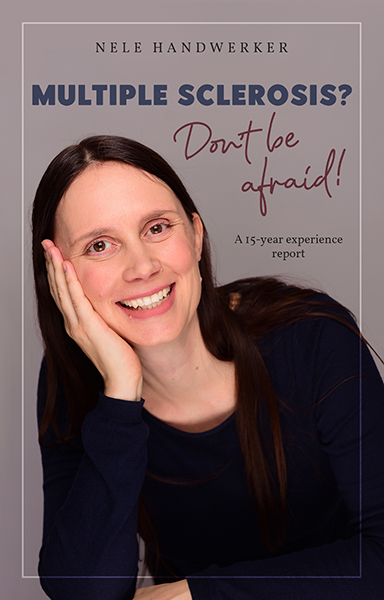Today I’m speaking with patient advocate Cathy Chester, whose blog, An Empowered Spirit, is an important resource for those affected by multiple sclerosis on a wealth of topics related to living with multiple sclerosis. Cathy received her MS diagnosis in 1986, long before the first disease-modifying treatments (DMTs) were available.
We talk about her personal experience and coping strategies, treatment options, but also the challenges of the support system in the United States. And because the U.S. is such a large country with immense diversity in all dimensions, our conversation covers only a part of this system, without claiming to be exhaustive. It is one perspective from a very dedicated patient advocate, which can of course be expanded to include many more.
Klicken Sie auf den unteren Button, um den Podcast zu laden.
Table of Contents
Introduction - Who is Cathy Chester
Thank you for this opportunity to speak with you and your listeners, Nele. For your listeners: My name is Cathy Chester, and I’ve been living with multiple sclerosis since 1986. I was dating my husband for a year before my diagnosis, and we married in 1988. Our wonderful son was born in 1992. We live a simple life filled with love and laughter and conquer adversity as a team. We love cats and are getting ready to adopt two for our family! I’m grateful for my husband and son every day.

Personal Experiences and Coping Strategies
Can you briefly share your personal journey with MS and how it has impacted your life?
In 1981, I was in a severe car accident that resulted in a concussion. My feet were suddenly numb, and after an exam by our family doctor, he announced I was wearing shoes that were too tight.
After ignoring a growing number of symptoms for several years, including weakness, numbness, and overwhelming fatigue, a neurologist diagnosed me with MS. At the time, there were no approved MS medications. I was told to give up my job and apartment, move home with my parents, and if I experienced further exacerbations, call him for a round of steroids. I followed his advice but refused to give up.
The trajectory of my life was forever changed when I realized at that young age that my mission from then on would be to help others in the MS community, to prevent them from feeling overwhelmed, fearful, or misinformed about their future with this unpredictable disease.
In your experience, what are some of the most effective coping strategies or self-care practices for managing the daily challenges of living with MS?
It’s different for everyone. A few strategies help me relax, de-stress, and empty the tank of negative thinking. Nothing completely removes MS from my thoughts, but sometimes, I can keep it at bay to give me much-needed breathing room and calm.
- My best strategy is to spend as much time as possible walking accessible trails in nature. I love breathing in fresh air and listening to the sound of a forest or beach. A day outdoors is the most restorative therapy for me. It reminds me of my happy childhood, surrounded by acres of woods.
- I also practice meditation, learning to focus on my breath while dumping negative thoughts into an imaginary bucket to remove any toxicity. That imagery works for me.
- Binge-watching classic films (from around 1935- 1960) and television programs (from about 1949 – 1977) relaxes me. I often become consumed with the story, and I feel at ease.
- I’m very spiritual. Honestly, most holistic therapies interest me, and if they can help me feel lighter and more in control of positive living, then I’m all in!
How important is mental health and emotional well-being for individuals with MS, and what support is available in this regard?
Thankfully, the stigma attached to mental health and emotional well-being is being reduced. This is a tremendous step forward in our society, and those within the MS community will undoubtedly benefit from realizing that help is only one phone call away. There’s no shame in asking for help; those with MS need to know this.
I know firsthand how valuable talk therapy is. After one particularly difficult exacerbation, I sought help from a reputable psychologist who was a tremendous help to me and, in turn, my family. Our emotional health is crucial for living with an unpredictable disease. Staying as emotionally strong as possible is our priority. We need to tend to ourselves first for our own sake and also for our loved ones.
Treatment and Care in the United States
What types of MS treatments, therapies, or interventions are more commonly recommended or accessible in the United States?
All DMTs are being recommended in the US, but not HSCT, since it’s not FDA-approved. In the US, the Food and Drug Administration must approve a therapy before doctors can recommend it, and hopefully, an insurance company will pay for it. By rehab, if you mean physical or occupational therapy and similar therapies, if a patient needs a specific therapy, the doctor will prescribe it. If the patient’s insurance company pays for it (or if a patient has the resources to pay out-of-pocket for it), we can schedule some appointments with the therapist.
Are there any specific laws or regulations in United States that protect the rights and promote the well-being of individuals living with MS?
The Americans with Disabilities Act of 1990, or ADA, is a civil rights law that prohibits discrimination based on disability. It also requires covered employers to provide reasonable accommodations to employees with disabilities and imposes accessibility requirements on public accommodations.
Challenges and Support Systems in the United States
What types of healthcare professionals are typically involved in the care and management of MS in the United States, and what role do they play?
Typically, a neurologist is used in the care of MS. Patients may also need to go to more specialized doctors for other issues of MS, including a urologist (bowel and bladder), an ophthalmologist (MS issues of the eye such as optic neuritis), gastroenterologist (problems with the gut such as constipation), cardiologist (heart), and so on. A general practitioner(MD) is generally used to treat the whole patient.
Are there any specific resources or support networks available for MS patients in the United States, such as patient associations or community organizations?
Many MS organizations within the United States include NMSS, MSAA, MSF, CanDo MS, Rocky Mountain MS Center, Race to Erase MS, and others—many sponsor local community organizations, such as patient-led support groups and speakers of interest.
Are there additional challenges to living with MS when you are over 60?
MS is different for everyone, so I’d say the challenges in aging while living with MS are unique to each patient. I’m unhappy when I hear stories of patients aged 60 and older not being offered medications because of their age. There may be extenuating circumstances that I’m not privy to, but overall, MS is with us for our entire life, so why shouldn’t we always be on MS medications? This is ridiculous. I’ve also noticed that many marketing campaigns are geared toward younger audiences. Look at most PR campaigns for medications or MS-related organizations; you’ll see mostly younger faces. There’s nothing wrong with that – after all, most people are diagnosed when they’re younger. But you get a skewed picture of MS when you leave out those aging with the disease. Lastly, I’ve noticed specific MS-related initiatives counting out people over page 55 or 60. I know this is true from personal experience. Older people have the experience and expertise based on life lessons! We add value to any campaign, and our information is priceless.
As I age, I don’t know if something is a symptom of MS or a part of aging. Sometimes it’s hard to tell. All I know is I/we must continue to take special care of our physical, spiritual, and emotional health if we want to age as gracefully as possible.
Education, Awareness, and Advocacy
Are there any specific initiatives or programs in the USA that focus on raising awareness about MS and educating the public about the condition?
Yes, many MS organizations focus on supporting patients and their loved ones and creating awareness of what MS is and isn’t. The National MS Society, MS Foundation, MS Association of America, CAN DO MS, Race to Erase MS, Rocky Mountain MS Centers, and many others. We also have the Consortium of MS Centers/the International Organization of MS Nurses and the MS registries that include NARCOMS (North American Research Committee on MS and iConquerMS.
How can individuals with MS in the USA actively advocate for themselves and ensure they receive appropriate care, support, and accommodations?
Speak up for yourself, self-advocate, bring someone to appointments to be your advocate, read, stay curious, and put together a medical team you feel comfortable with. You must be able to approach your doctors/therapists/nurses to get ALL of your questions answered. We deserve to be treated with dignity and respect and should never settle for less.
What role do family members and caregivers play in supporting individuals with MS in the United States, and what resources are available to support them?
Family members and loved ones are crucial to a patient’s health. They can be a great source of support and compassion when needed. Care partners (I prefer that term to caregivers) can find help from all of the MS organizations I mentioned since more is being discussed on the importance of supporting caregivers. If a care partner needs help, find a qualified psychologist (for example) to speak to.
What advice would you give to individuals with MS in the USA who may be feeling overwhelmed or discouraged? How can they maintain a positive outlook?
Take one day at a time and do the best you can within your abilities. Anything you do will be enough – don’t allow anyone to tell you it’s not. Lean on others for help, either professionals or trusted loved ones. Learn as much as possible about the disease and consider therapies outside the box (such as the many holistic therapies now being offered.) There are many helpful phone apps to guide you, such as Headspace, Calm, and Insight Timer.
Quickfire Q&A Session
Complete the sentence: "For me, multiple sclerosis is...."
…an unpredictable disease that’s been both a gift and a tremendous nuisance.
Which website can you recommend for people living with MS in the USA?
Any of the MS organizations I already mentioned are the best websites for people with MS and their loved ones.
What development would you like to see in the field of multiple sclerosis in the next 5 years?
I’d like more and better research; I’d like to see stem cells be FDA-approved and become affordable for more patients, and I’d like to see more research on the prevention of Epstein-Barr-Virus and the use of that research to help those in the MS community.
Farewell
Finally, what message of hope or encouragement would you like to share with individuals living with MS in the United States?
When I was diagnosed in 1986, there were no FDA-approved medications. Fast forward to today, and there are over 20. The needle will continue to move forward, and a cure will hopefully be found for the next generation. At the very least, there will be more and better ways to help manage the disease to help patients live a better quality of life.
How and where can interested people find you online?
- My award-winning blog is AnEmpoweredSpirit.com
- Facebook – https://www.facebook.com/cathy.chester1
- Instagram – https://www.instagram.com/thecathychester/
- Twitter – https://twitter.com/CathyChes
- Threads – https://www.threads.net/@thecathychester
- LinkedIn – https://www.linkedin.com/in/cathychester/
A big thank you to Cathy for her continued commitment to making the needs of people with MS visible and giving the community a voice that is heard. The mix of personal experiences, positive outlook on life and tips for living a full life despite MS are a great resource.
See you soon and try to make the best out of your life,
Nele
For more information and positive thoughts, subscribe to my newsletter for free.
Click here for an overview of all podcast episodes published so far.

And at many more places.
* This text contains affiliate links. This means that I get a small compensation if you buy the product recommended by me through the link. For you nothing changes in the price of the product. And it helps me to pay for the blog and to write new posts.










